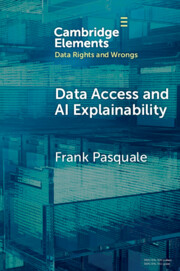Refine search
Actions for selected content:
7 results
Rethinking Cybersecurity Research Governance: Lessons from the Act on Digital Services?
-
- Journal:
- European Journal of Risk Regulation , First View
- Published online by Cambridge University Press:
- 29 October 2025, pp. 1-17
-
- Article
-
- You have access
- Open access
- HTML
- Export citation

Data Access and AI Explainability
-
- Published online:
- 12 September 2025
- Print publication:
- 02 October 2025
-
- Element
-
- You have access
- Open access
- HTML
- Export citation
Data Sharing in the Internet of Medical Things: Between the Data Act and the EHDS
-
- Journal:
- European Journal of Risk Regulation / Volume 16 / Issue 3 / September 2025
- Published online by Cambridge University Press:
- 02 April 2025, pp. 1115-1137
-
- Article
-
- You have access
- Open access
- HTML
- Export citation
The REDATAM format and its challenges for data access and information creation in public policy
-
- Journal:
- Data & Policy / Volume 7 / 2025
- Published online by Cambridge University Press:
- 17 February 2025, e18
-
- Article
-
- You have access
- Open access
- HTML
- Export citation
Graph-based information management for retrofitting long-living assets
-
- Journal:
- Data-Centric Engineering / Volume 5 / 2024
- Published online by Cambridge University Press:
- 20 December 2024, e46
-
- Article
-
- You have access
- Open access
- HTML
- Export citation
6 - Antitrust in Separation of Powers
- from Part II - Interactions
-
- Book:
- Separation of Powers and Antitrust
- Published online:
- 28 September 2023
- Print publication:
- 12 October 2023, pp 85-114
-
- Chapter
- Export citation
19 - Data Access Governance
- from Section IB - Tools, Processes and Actors
-
-
- Book:
- The Cambridge Handbook of Health Research Regulation
- Published online:
- 09 June 2021
- Print publication:
- 24 June 2021, pp 187-196
-
- Chapter
-
- You have access
- Open access
- HTML
- Export citation
